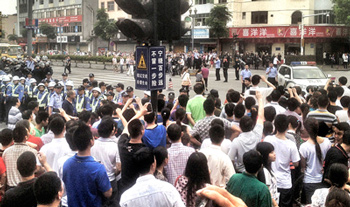

Vol. 78/No. 17 May 5, 2014

|
| Reuters |
| Workers at Yue Yuen shoe factory went on strike April 15 after company refused to pay promised benefits. There has been 31 percent increase in strikes in China this year. |
The Taiwan-owned company employs more than 400,000 people in factories in China, Vietnam and Indonesia. Some 45,000 work at its massive 10-story complex in Dongguan.
The protest began April 5, when hundreds of workers took to the streets and blocked a bridge. Negotiations between the two sides then resolved nothing. On April 14 Yue Yuen announced it would offer new contracts to all employees on May 1, but would not pay housing and social security funds owed before that date.
Thousands of workers took to the streets in response. The protests continued April 15 when some 40,000 walked off the line and several thousand marched from the factory to the municipal building and staged a sit-in protest. Hundreds of riot police armed with batons attacked the strikers, arresting dozens. Others were hospitalized.
An anonymous source in the company’s human resources department confirmed to the Xinhua News Agency April 16 that the company has only covered housing payments for some 1,000 workers and that payments to the social insurance program have been lower than legally required.
The strike continues as of April 22 with additional demands for a 30 percent wage increase and their own representatives in the negotiations, which include officials from the company, the local government and the government-sanctioned All China Federation of Trade Unions.
There has been a 31 percent increase in strikes in China during the first quarter of 2014 compared to the same period last year, reported Hong Kong-based China Labour Bulletin. Several have involved big international corporations, including Walmart, Pepsi, IBM and Samsung. More than 50 percent were over wage arrears and demands for compensation when factories closed and moved.
A survey over the past decade of 400 factories by the U.S.-based group China Labor Watch reported that not a single one had fully complied with social security laws.
The Chinese economy has slowed down from the previous decade, when the gross domestic product rose by more than 10 percent almost every year. In both 2012 and 2013 growth was 7.7 percent. Meanwhile, workers’ strikes and other labor actions have been able to wrest some wage increases and other gains. In response, companies have been increasingly relocating from China’s coastal region to poorer inland provinces or to other countries, such as Bangladesh, Vietnam, Cambodia and Indonesia. Since 2010 Nike produces more shoes in Vietnam than in China, and Adidas announced in 2012 that it would close its last factory in China.
Related articles:
Boston school bus drivers: ‘Reinstate fired unionists!’
Front page (for this issue) | Home | Text-version home